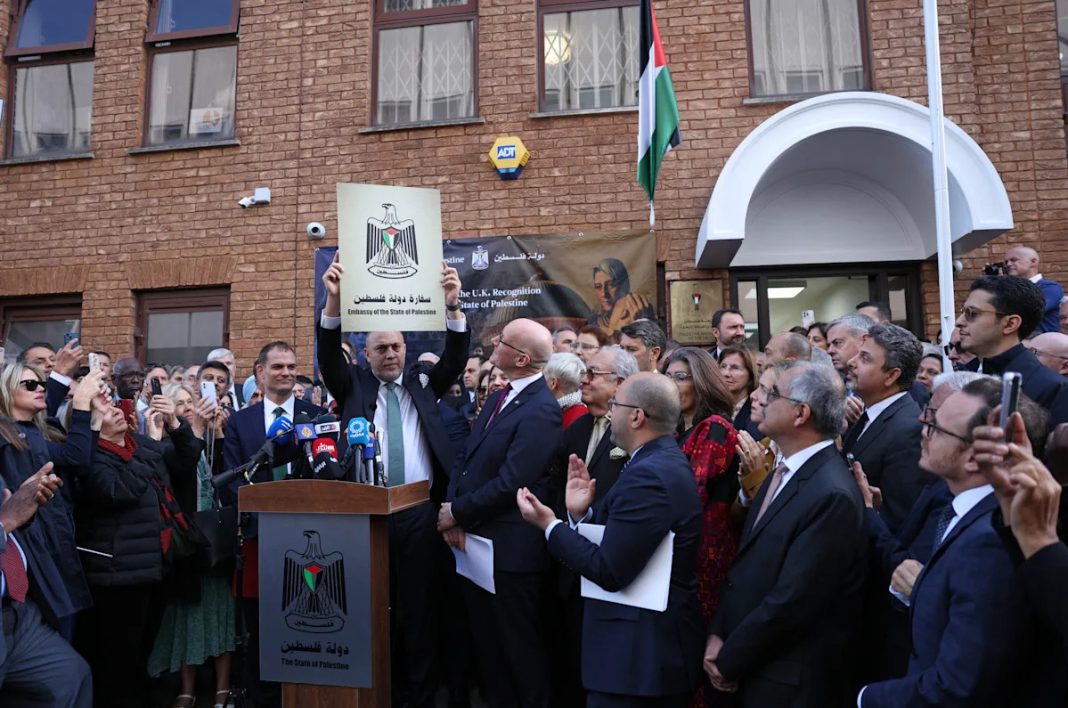France, Luxembourg, Malta, Monaco, Andorra and Belgium have formally recognised a Palestinian state at the 80th session of the General Assembly (UNGA).
They join Canada, Australia and Portugal, as well as the United Kingdom, which announced its recognition on Sunday, as Israel pushes ahead with settlement expansion in the occupied West Bank and escalates its genocide in Gaza.
The UK’s decision to formally recognise a Palestinian state comes more than 100 years after the Balfour Declaration backed “the establishment in Palestine of a national home for the Jewish people” and 77 years after the creation of Israel in the British Mandate of Palestine.
“In the face of the growing horror in the Middle East, we are acting to keep alive the possibility of peace and of a two-state solution,” UK Prime Minister Keir Starmer said in a video statement Sunday.
The declarations by major Western powers – long considered close allies of Israel – underscore its growing international isolation amid a war on Gaza which has killed more than 65,000 Palestinians.
Which countries now recognise Palestine?
Currently, the State of Palestine is recognised as a sovereign nation by 157 of the 193 UN member states, representing 81 percent of the international community. In addition, it is recognised by the Holy See, the governing body of the Catholic Church and Vatican City, which holds UN non-member observer status.
These countries are listed in the table below:
What does recognition mean?
Recognising Palestine strengthens its global standing, boosts its capacity to hold Israeli authorities accountable for their occupation, and increases pressure on Western powers to work towards a two-state solution. Specifically, it would allow Palestinians to:
-
Open embassies with full diplomatic status
-
Engage in trade agreements
-
Gain support at international forums
-
Approach the International Criminal Court (ICC)
Recognition will not:
-
Stop Israel’s brutal military occupation.
While recognition has little immediate effect on Israeli policy in the occupied territory, it does reflect a surge of international backing for Palestinian statehood.
Martin Griffiths, director of Mediation Group International, told Al Jazeera the recognition of Palestine is only a first step.
“This is the entry point, but it’s not the end point,” he said, urging countries such as the UK to uphold their obligations under the International Court of Justice by facilitating humanitarian aid, ending arms sales and easing blockades.
He added that governments must also support reforms to make the Palestinian Authority “fit for purpose”, noting efforts by France, Saudi Arabia, Norway and Spain.
“It brings hope … but it doesn’t necessarily bring a future yet,” Griffiths said.
Together with Mexico, these countries marked 11 new recognitions in 2025 and the 20th since Israel’s war on Gaza began in October 2023, reflecting a growing wave of international recognition for Palestine.
Israel’s reaction
Israel’s UN ambassador, Danny Danon, described the UN summit on Palestinian statehood as a “circus” and said moves to recognise Palestine “reward terrorism”.
Israeli Prime Minister Benjamin Netanyahu reiterated that message in his reaction to Sunday’s recognition of Palestine by the UK, saying it was a “prize” for Hamas.
He added that a Palestinian state “will not happen”.
A brief history of Palestinian recognition
On November 15, 1988, during the first Intifada, Yasser Arafat, chairman of the Palestine Liberation Organization (PLO), declared the establishment of an independent State of Palestine with Jerusalem as its capital.
More than 80 countries quickly extended recognition, largely from the Global South – including nations in Africa, Asia, Latin America and the Arab world. Most European recognitions at the time came from states within the former Soviet bloc.
On September 13, 1993, the Oslo Accords marked the first direct negotiations between Palestinians and Israelis, envisioning a Palestinian state alongside Israel. That outcome, however, never materialised.

(Al Jazeera)
In 2012, the UNGA voted overwhelmingly – 138 in favour, 9 against and 41 abstentions – to upgrade Palestine’s status to a “non-member observer state”. This means that Palestine cannot vote on resolutions, but it can attend meetings and participate in debates.
Only the five permanent members of the UNSC – US, Russia, China, France and the UK – hold veto power. They gained this status in 1945 as the major victors of World War II. This allows any one of them to block a resolution, regardless of wider international support.
On April 18, 2024, the US vetoed a widely supported resolution in the General Assembly that would have granted Palestine full UN membership, blocking the upgrade despite broad international backing.
The US has a long history of vetoing UNSC resolutions critical of Israel, having done so at least 50 times since joining the UN. This consistent use of the veto has often prevented measures addressing Israeli military actions, illegal settlements or the occupation of Palestinian land from being adopted.

(Al Jazeera)

